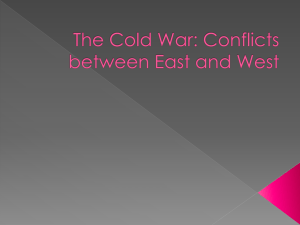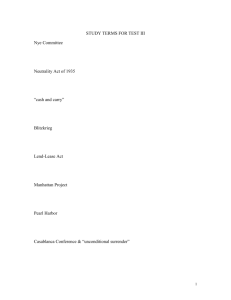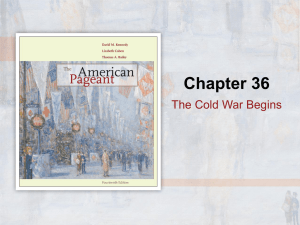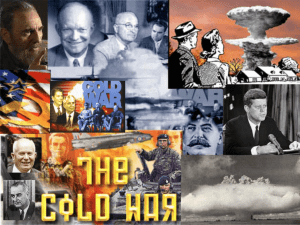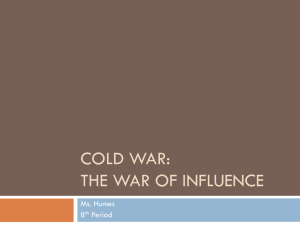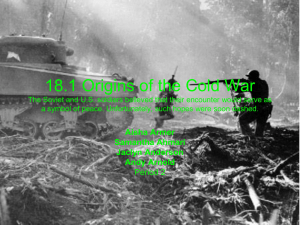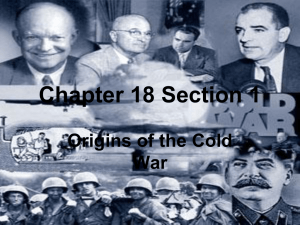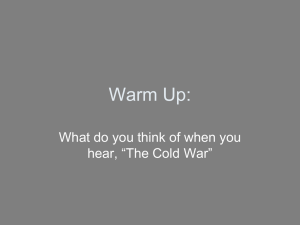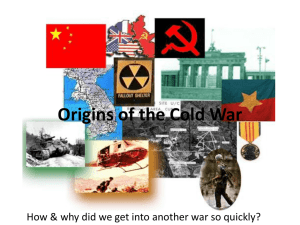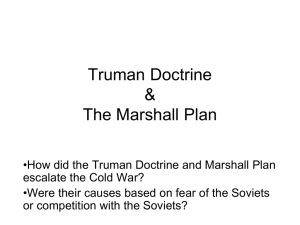Lecture Notes
advertisement
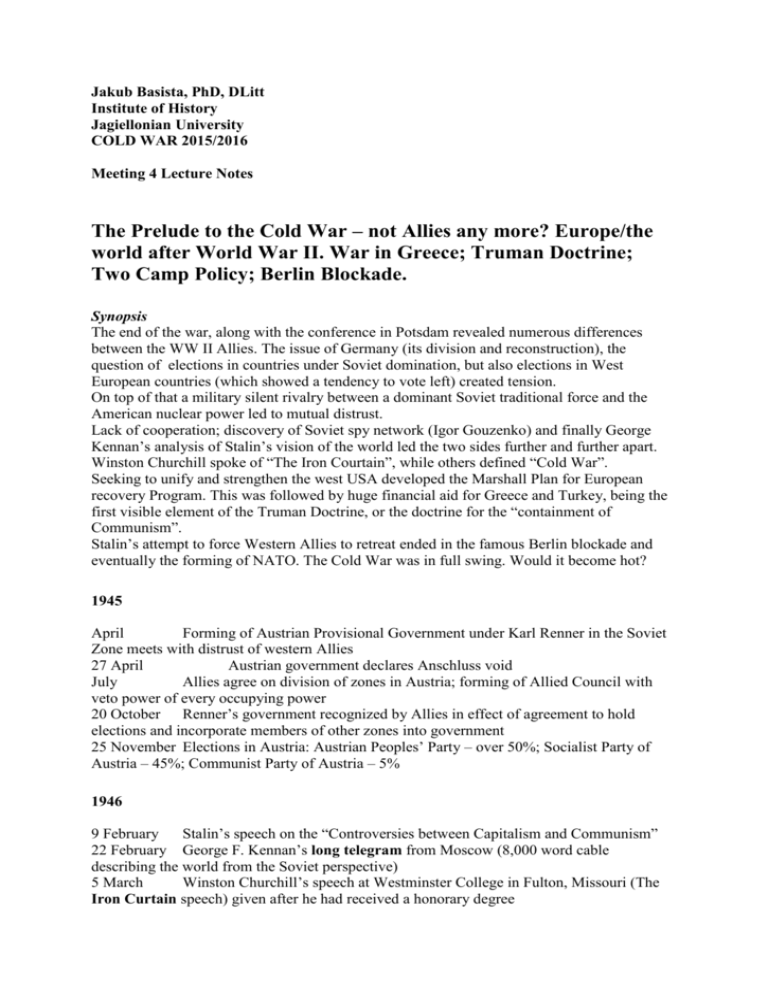
Jakub Basista, PhD, DLitt Institute of History Jagiellonian University COLD WAR 2015/2016 Meeting 4 Lecture Notes The Prelude to the Cold War – not Allies any more? Europe/the world after World War II. War in Greece; Truman Doctrine; Two Camp Policy; Berlin Blockade. Synopsis The end of the war, along with the conference in Potsdam revealed numerous differences between the WW II Allies. The issue of Germany (its division and reconstruction), the question of elections in countries under Soviet domination, but also elections in West European countries (which showed a tendency to vote left) created tension. On top of that a military silent rivalry between a dominant Soviet traditional force and the American nuclear power led to mutual distrust. Lack of cooperation; discovery of Soviet spy network (Igor Gouzenko) and finally George Kennan’s analysis of Stalin’s vision of the world led the two sides further and further apart. Winston Churchill spoke of “The Iron Courtain”, while others defined “Cold War”. Seeking to unify and strengthen the west USA developed the Marshall Plan for European recovery Program. This was followed by huge financial aid for Greece and Turkey, being the first visible element of the Truman Doctrine, or the doctrine for the “containment of Communism”. Stalin’s attempt to force Western Allies to retreat ended in the famous Berlin blockade and eventually the forming of NATO. The Cold War was in full swing. Would it become hot? 1945 April Forming of Austrian Provisional Government under Karl Renner in the Soviet Zone meets with distrust of western Allies 27 April Austrian government declares Anschluss void July Allies agree on division of zones in Austria; forming of Allied Council with veto power of every occupying power 20 October Renner’s government recognized by Allies in effect of agreement to hold elections and incorporate members of other zones into government 25 November Elections in Austria: Austrian Peoples’ Party – over 50%; Socialist Party of Austria – 45%; Communist Party of Austria – 5% 1946 9 February Stalin’s speech on the “Controversies between Capitalism and Communism” 22 February George F. Kennan’s long telegram from Moscow (8,000 word cable describing the world from the Soviet perspective) 5 March Winston Churchill’s speech at Westminster College in Fulton, Missouri (The Iron Curtain speech) given after he had received a honorary degree 14 March Stalin’s reply to Churchill’s speech in a press interview 31 March Elections in Greece Communists abstain 15 April-16 May; 15 June-12 July Paris –2nd conference of the Council of Foreign Ministers to realize Potsdam agreement fails. 26 May Elections in Czechoslovakia are won by Communists with their allies, but result in a coalition government (about 45% of seats fall to Communists who acquired just over 38% votes) May USA and Great Britain stop paying USSR reparations from their zones (they took over 20 bln dollars to pass 12.5 mln). 7 August Russia demands control over Straits (Bosphorus and Dardanelles) and change of borders. 5 September USA and Great Britain sign an agreement concerning the economic unification of their occupation zones. September German Socialist Party wins elections in the Soviet occupation zone. September Christian Democrats, Social Democrats and Liberals win elections in the British and American zones September A plebiscite in Greece reintroduces monarchy October Civil war breaks out in Greece (ends with expulsion of Communists in August 1949) 4-12 December New York – 3rd conference of the Council of Foreign Ministers decides to solve the German question in Moscow. 1946 Communists/Socialists score exceedingly well in Italy (18.93%/20.68%) 1946 Communists/Socialists score electoral victories in France 1947 1 January Creation of Bizonia. 19 February Rigged elections in Poland result in the Democratic Electoral Block securing safe 80% against the opposition Polish Peasant Party receiving barely 10% 21 February Britain informs USA about stopping its assistance to Greece 10 March – 24 April – Moscow – 4th conference of the Council of Foreign Ministers does not reach agreement due to ongoing processes in both parts of Germany as well as CE. 12 March Harry Truman announces an address to a joint session of Congress, what becomes known as the Truman Doctrine for the containment of Communism and struggle against “world revolution”. Accepted by Senate (22 April) and House of Rep. (10 May) this doctrine was applied in Greece and Turkey. April Bernard Baruch calls the new policy “cold war”: a policy to stop Soviet expansion from the position of force. 30 May Communist coup in Hungary July George F. Kennan publishes an article: The Source of Soviet Conduct, in Foreign Affairs signed by X. The article, together with the earlier long telegram speak of the policy of “containment” of Communism. Kennan was deemed to be a principal architect of America's Cold War strategy. Kennan died in 2005. 5-6 June Announcing of the Marshall Plan (George C. Marshall, US Secretary of State announces a Project of European Reconstruction) June realization of economic Bizone 12-15 June Paris conference on the Marshall Plan (Western powers decide to include Germany) 5 July Soviet representatives reject the plan forcing Central East European countries to act alike 12 July – 22 September – Paris conference on the Marshall plan with 16 Western states • Bernard Baruch, a wealthy financier and adviser to President Harry S. Truman, uttered the words, "Let us not be deceived—today we are in the midst of a cold war," in 1947 during a congressional debate. That same year, journalist Walter Lippmann wrote a series of articles titled "The Cold War" that was first published in the New York Herald Tribune. Both men are credited with popularizing the term "cold war," but neither could have known the tremendous impact the Cold War would have on the world over the second half of the 20th century. 1 September The forming of Cominform during a meeting in Szklarska Poręba in Poland 22 September Establishing of Organization for European Economic Co-operation for the distribution of E.R.P. (European Recovery Program) money - $ 13-14 billion November GB, USA and France decide on the future unification of Germany 1948 February West German lands included in the Marshall Plan 25 February Communist coup in Czechoslovakia 20 March Soviets withdraw from the Four-Power Allied Control Council after Western powers decide to introduce new currency in their zones 18/20 June monetary reform in West Germany 24 June Beginning of the Berlin blockade (initiated by gen. Lucius Clay, the airlift supplied West Berlin with all items necessary to live and survive). Beginning of an airlift to supply Berlin to its three airfields, Tegel, Gatow, and Templehof: initially Dacotas were used, but later they were replaced by C-54s, carrying 1, 400 tons growing to 5,500 tons per day. 278,118 flights were carried out transporting over 2,3 million tons of supplies. Up to 927 flights daily transported up to 6,393 tons of goods. Crashes and accidents cost the lives of 70 aircrew (31 Americans and 39 British) as well as 7 Germans. Communist/Socialists score well again in Italian elections 30.98%. 1949 January establishing of Council for Mutual Economic Assistance 4 April establishing of NATO (Belgium, Canada, Denmark, France, Iceland, Italy, Luxemburg, The Netherlands, Norway, Portugal, UK, USA; in 1952 Turkey and Greece join NATO) 5 May Treaty of London establishes the Council of Europe 8 April creation of Trizonia 12 May Berlin blockade levied (Soviets acknowledge the failure of the blockade reopening Berlin) 23 May Federal Republic of Germany formed 29 August USSR explodes an atomic bomb; the first Soviet atomic test was internally code-named First Lightning (Первая молния, or Pervaya Molniya) 30 September Last flight of the operation Berlin Blockade takes place 7 October German Democratic Republic formed
